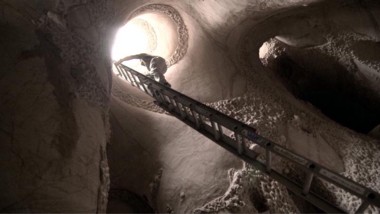We modern Americans have something of a short attention span. It seems hard-wired into our national character to always be on the go, and we like to consume just about everything in short, quick bursts. We get our coffee in paper cups at a window (who has time to get out of the car?), and prefer whenever possible that our meals can be eaten with one hand. When it comes to entertainment, most people I know spend more time on Netflix reading movie synopses and adding them to their queues than they do actually watching movies.
But quick isn’t always bad, as long as you give yourself time to savor the after-effects. Think of haiku: the poem is over in a breath or two, but a good one can leave you feeling changed for long after. So it is with short films. These works usually hover around the half-hour mark, but their tight focus means they can pack the same punch as a three-hour epic. Happily, the Oscar folks have made a push to get each year’s Short Film nominees out to theaters, so the public can catch these often underappreciated gems. This week, Amherst Cinema hosts two programs devoted to this year’s nominated short films in the documentary category.
The first grouping features three films. First up is The Lady in Number 6: Music Saved My Life, the story of Alice Herz Sommer. At 109, she is the world’s oldest Holocaust survivor. She is also—not, she would say, coincidentally—the world’s oldest pianist; in the film she discusses her belief in the importance of music in sustaining a life marked by horror. It is followed by Karama Has No Walls, Sara Ishaq’s look at the Yemeni response—from both the protesters and the government—to the Arab Spring movement. A peaceful protest that turned shockingly bloody, it’s a moment of world history not well known Stateside. The first program wraps up with Facing Fear, director Jason Cohen’s wrenching story of Matthew Boger, a gay teenager who was savagely beaten by a gang of neo-Nazis. Two decades later, Boger’s life again crosses paths with one of his attackers, leading to an improbable friendship and understanding.
The second program of films contains just two shorts. CaveDigger is a mind-blowing look at the work of New Mexico environmental sculptor Ra Paulette. Paulette’s “cathedral caves” look like something ancient, even alien: painstakingly carved spaces, cut out of the sandstone cliffs of northern New Mexico and illuminated by ghostly shafts of natural light, they offer a powerful reminder of nature’s profundity. After years of disagreement with patrons, Paulette has decided to dedicate himself to producing what he calls his Magnum Opus on his own terms.
The program then wraps up with Prison Terminal: The Last Days of Private Jack Hall, Edgar Barens’ film about a dying inmate in the Iowa state penitentiary. We sometimes forget that people die natural, nonviolent deaths in our prisons, but Barens’ film shows us that the hospice experience—here, the volunteers who care for Jack Hall are all, like Hall himself, prisoners—is not so very different inside the walls, and that the experience of death and dying can be just as moving for all those involved, even when (and perhaps especially when) the rest of their lives are lived under the reality of incarceration.
Also this week: The Academy of Music in Northampton brings in Deceptive Practice: The Mysteries and Mentors of Ricky Jay, for a one-time-only screening—blink and you’ll miss it—on Sunday afternoon at 2 p.m. The world-renowned magician, actor, and historian (his esoteric books on magic and its related ephemera are well worth tracking down) is a performer who dazzles not only with his sleight-of-hand but also with his breadth of knowledge. Here he traces his own history, from his early apprenticeship with his grandfather to his later work with the legendary Dai Vernon, and on to the television and film appearances that brought him to a wider audience.•
Jack Brown can be reached at cinemadope@gmail.com.



